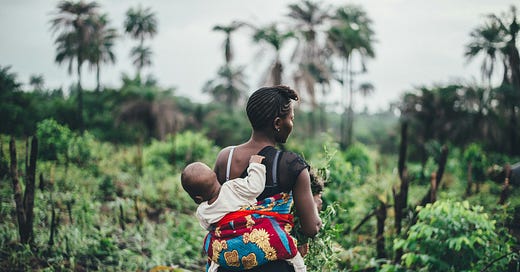A Selection from Another Mother Does Not Come When Yours Dies by Mubanga Kalimamukwento | Wayfarer Books 2025. \ Bookstore»
From Wayfarer Magazine, Issue 42»
I learn how to pray on my mother’s lap. We are at Bible study, as we are every Friday evening in the pastor’s house, surrounded by people I see on Fridays and then again on Sundays during the main service. My mother always starts these evenings quiet, only Shani-ing and Bwino, shani-ing between handshakes with the other adults in a whisper. Then she pulls her concentration face–lips pursed–and nods at everything the pastor says even though he tells zigzagging stories about lips-shut lions, talking shrubs, and direct conversations with God.
The smell of eat-sum-more biscuits and milked tea wafts up from the glass coffee table in the middle of the sitting room. I’m sure everyone’s stomach is grumbling, not just mine. But the routine is, no one moves to pick either biscuit or teacup until Amai Busa, the pastor’s wife, offers the tray just before we leave when the tea is too cold and the biscuits have hardened around the edges.
The first time we came here, I raised my hand to ask a question. My mother chuckled, pulling it down, telling me afterwards That’s not how things are done, even though I’d heard her tell the pupils she tutored that, questions were how we learnt.
I want to ask if the lion’s mouth was shut with a zipper or a lock, why no one thought to pour water on that poor shrub, and what number is God’s because I like memorizing phone numbers. But I remain quiet, remembering how my mother says, Once is for the instruction, the second will be a slap, and rub my cheek as if it is already stinging.
My mother has no questions and only breaks her reverie by mouthing her Amen. The pastor is talking about a marriage between repentance and forgiveness at this point, explaining that the children of that marriage are blessings like he and his wife enjoy now. He points to the chandelier with its knife-sharp prisms, at their daughter, Hosanna, who is reading a children’s Bible next to her mother, and then at his car keys laid next to the biscuits and cooling tea. I watch his fat pointer finger float from blessing to blessing and conjure this God as a fairy, blessing and blessing and blessing.
Amen, goes my mother’s mouth. Her breath, still pepperminty because she insists on us brushing our teeth before we leave the house, kisses me lightly on my head.
This sermon–like the ones before–ends with the same series of promises of restoration, that God will rebuild whatever area of our lives had been eaten by termites, the way he did for Joseph and for Hannah and for Jacob and Sarah.
Hallelujah! Preach it! Glory! and Amen! jump out from the adults’ mouths like fireflies. This is where my mother’s voice steps in, warm as freshly fried vitumbuwa, round as the hug she has me enveloped in. She joins in the incantations, the first of the adults to flee English and dip into a language of her own fabrication, but no one minds. They start down parallel paths of gibberish, which my mother told me is called speaking in tongues. I shut my eyes. The way their tongues crash into each other reminds me too much of the rainy season’s first thunder, how, even though November petrichor warns of its coming, my heart never fails to jolt at the sound. I always run to hide under the blankets as if they can shield me from the rapid, incessant booming.
The vibrations of my mother’s voice through her chest drum against my ears, climbing louder and louder until, just when I think whatever holds sounds in it will split at the seams, she stops with a tear-stained Amen. I can speak six languages: English–because my teacher whips anyone who doesn’t speak it; Bemba–for my nanny, who has been with us since before my memory crystallized; French, which my mother teaches at the Girls Secondary School near the town fence; and enough Tonga, Nyanja, and Luvale for all the grown-ups who hear me to fawn and say Wow, such a clever girl. But what language does God speak, one of my six or one of these tongues? I wonder if mouthing along with my mother would count as my seventh, even though I can’t entirely untangle the meaning from the sounds.
Whatever language God speaks, it is not one of these because my mother will come to this Bible study waiting for the restoration promise until I’ve outgrown her lap.
Mubanga Kalimamukwento (she/her) is a Zambian attorney, editor, and writer. She is the author of The Mourning Bird (Jacana), unmarked graves (Tusculum University Press), Obligations to the Wounded (University of Pittsburgh Press), Another Mother Does Not Come When Yours Dies (Wayfarer Books) and Shipikisha (forthcoming from Dzanc Books). She has an MFA in creative writing from Hamline University, is the founding editor of Ubwali Literary Magazine, a 2024 Miles Morland Scholar, and a PhD student and Interdisciplinary Center for the Study of Global Change (ICGC) scholar at the University of Minnesota Twin Cities.





